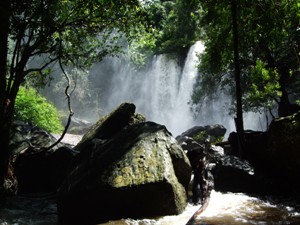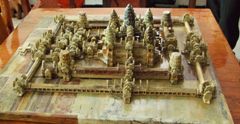Phnom Kulen National Park | Attraction in Siem Reap

Phnom Kulen is a National park in Cambodia. It is literally translated as "Mountain of Lychees". It is located in the Phnom Kulen mountain massif in Siem Reap Province. During Angkorian era the relief was known as Mahendraparvata (the mountain of Great Indra) and was the place where Jayavarman II had himself declared chakravartin (King of Kings), an act which is considered the foundation of Khmer Empire. Rather than a hill range, Phnom Kulen is an isolated chain of small mountain plateaux of moderate height lying south of the Dangrek Mountains, stretching for about 40 km in a WNW - ESE direction, and is located some 48 km north of Siem Reap. Its highest point is 487 m and its height is quite regular, averaging 400 m all along the range. Geologically, Phnom Kulen is formed of sandstone. It was important as a quarry in Angkorian times, the major quarries being located in the southeastern angle of the massif. There is a sacred hilltop site on top of the range. Phnom Kulen is considered a holy mountain in Cambodia, of special religious significance to Hindus and Buddhists who come to the mountain in pilgrimage. It also has a major symbolic importance for Cambodians as the birthplace of the ancient Khmer Empire, for it was at Phnom Kulen that King Jayavarma II proclaimed independence from Java in 802 A.D
Locals often make a pilgrimage to pray at this holy site. There is an interesting active pagoda with a large reclining Buddha, carved at a top of a gigantic groundup rock. A sanctuary was built around the upper part of the rock, about 10m high, The architectural design is very distinctive as it makes the Buddha statue appears as if he is laying down sideway facing pilgrims who walk up there on the stairway for a quick prayer. To many visitors, it is a starting point of their visit. Among many other artifacts surrounding the area, there are two gigantic rocks nearby that locals believe a resemblance of a legendary story Sampeuv and Sampan who betrayed and fought each other resulted in their ships sunk in this area. There are pathways from pagoda to some splendid waterfalls and picnic areas. There is a pathway from the pagoda, through local villages, to the a breathtaking view of a water fall. Visitor can say at the upper level of the fall or go down via a wooden stairway to the lower part of the falls.








